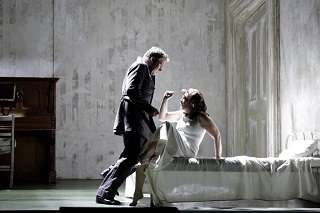|
Back
Raw Deal Chicago
Lyric Opera of Chicago
02/15/2020 - & February 19, 23, 26, March 1, 2020
Peter Ilyich Tchaikovsky: The Queen of Spades, Opus 68
Brandon Jovanovich (Gherman), Kyle van Schoonhoven (Chekalinsky), David Weigel (Sourin), Samuel Youn (Count Tomsky), Lucas Meacham (Prince Yeletsky), Jane Henschel (Countess), Sondra Radvanovsky (Liza), Elizabeth DeShong (Paulina), Emily Pogorelc (Masha), Jill Grove (Governess), Mario Rojas (Major-domo), Laura Wilde (Chloë), Eric Ferring (Chaplitsky), Anthony Reed (Narumov)
Lyric Opera of Chicago Chorus, Michael Black (chorus master), Chicago Children’s Choir, Josephine Lee (chorus master), Lyric Opera of Chicago Orchestra, Sir Andrew Davis (conductor)
Richard Jones (production), Benjamin Davis (revival director), John Macfarlane (sets and costumes), Jennifer Tipton (lights)

B. Jovanovich, S. Radvanovsky (© Corey Weaver)
Tchaikovsky’s ultimate opera of fate is interwoven with fate at the Lyric Opera of Chicago itself. Absent from the company’s repertoire for twenty years, it was the first opera that music director Sir Andrew Davis conducted here. Now, as Sir Andrew prepares to leave his post next season, he has returned to it.
Musically, the effort could not have scored a greater success. Every aspect of Sir Andrew’s conducting let the score reverberate in all its creepy magnificence, though at times he slowed the tempo in what seemed like an effort to create suspense when in fact suspense is already amply written into it. Brandon Jovanovich’s Gherman, the opera’s oily, desperate hero, pursued Liza with effortlessly resounding high notes through an entire evening performing a role commonly called “the Russian Otello.” As Liza, the object of his fatal attraction, Sondra Radvanovsky bloomed in smooth, round tones. Gone are the pitch issues and metallic sound that had generated some critical comment in years past. Radvanovsky is back, fully on point, and should look forward to a stunning and accomplished midcareer. Samuel Youn’s purring baritone, known from his gripping Alberich in Lyric’s Ring Cycle, delivered the meddling Count Tomsky with a devilish charm that Richard Jones’s production made quite literal. Lucas Meacham sang well as Prince Yeletsky, showing off a superb legato in a role that, in losing Liza to a ne’er-do-well like Gherman, is fundamentally a bore. The fine character mezzo Jane Henschel made a long overdue Lyric debut as the Old Countess, a hag if ever there were one. The endearing Jill Grove was a touch of luxury casting as Liza’s governess, in this production a chain-smoking vamp.
Jones, who staged Lyric’s vocally impressive production of Handel’s Ariodante last season, seems to have a penchant for making the operas he directs downcast and depressing. This Queen of Spades did not unfold in the glory of Imperial Russia, but in some kind of grim 1930s dystopia. The program describes it as “fascist,” but the opera’s inescapably Russian idiom more immediately suggested a post-revolutionary Soviet Union, in which the opera’s aristocratic characters hold on in greatly reduced circumstances. Either way, it just did not work. Bland totalitarianism lends itself poorly to passionate romance and the stuff of obsession, but even if it did the production’s highly abstract conceit, which argues that Tchaikovsky’s music anticipated the expressionist music of the chronological era depicted, rests on a false premise. The Queen of Spades, which premiered in 1890, stands at the end – and is in many ways the highest expression of – the swelling Late Romantic. The composer rejected the Wagnerian label, but he wrote an opera about a love that can find no earthly resolution, unavoidable fate guided by the morbid supernatural, and a hero who becomes suicidal – and then filled it with an impressive catalog of leitmotifs that twist and bend to reflect the opera’s emotive associational vicissitudes. The expressionist genre lay rather in the future and belonged to a later generation. All we are left with in its absence is a sea of gray sameness in John Macfarlane’s nondescript sets and bedraggled costumes, punctuated with kitschy puppetry that replaces the Act II pastorale and then, with comic effect that was almost uncertainly unintended, animates the haunting scene, where the Old Countess appears to Gherman as a chalky skeleton that shares his bed while her lines are voiced offstage. The final scene, a lively gambling sequence in which Gherman loses everything, includes a bizarre drag show by a solo dancer, who prances about in a dubious illustration of Tomsky’s bawdy ballad. Tomsky’s final act is to crawl like a devil stalking the dying Gherman, unnecessarily magnifying the lesser character’s importance while diminishing the individual tragedy.
The musical effort rated high, but Tchaikovsky’s intoxicating opera deserves a better visual effort to explore its full effect.
Paul du Quenoy
|